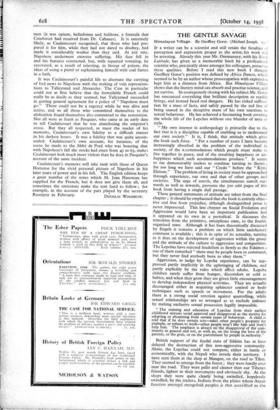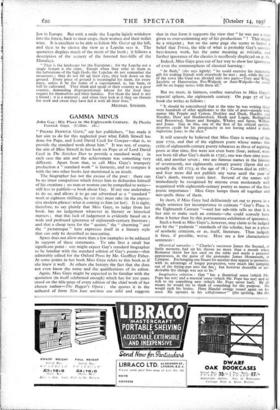THE GENTLE -SAVAGE
Himalayan Village. By Geoffrey Gorer. (Michael Joseph. 25 IF a writer can be a scientist and still retain the faculties of perception and expression proper to the artist, his work will be arresting. Already this year Mr. Ommanney, with his Smith Latitude,- has given us a memorable • book by a professional scientist who, practically alone amongst his colleagues, possesses these qualities. Before I read this new book I thought Geoffrey Gorer's position was defined by Africa Dances, which seemed to be by an author whose preoccupation with expression kept him at a distance from Africa. But Himalayan Village shows that the literary mind can absorb and practise science, and yet survive. In courageously closing with his subject Mr. Gorer has renounced everything that brilliant description so readily brings, and instead faced real dangers. He has risked suffoca- tion by a mass of facts, and safely passed by the sad fate of being snared in the deceptive maze of his own reactions to sexual behaviour. He has achieved a fascinating book covering the whole life of the Lepchas without one blunder of taste or
style.
" My own interest in anthropology is primarily due to the fact that it is a discipline capable of enabling us to understand our own society." It is, I think, this attitude which gives the book such force. " For a number of years I have become increasingly absorbed in the problem of the individual in society, of the accommodations which people must make to live together in-peace, and- of the resulting happiness or un- happiness which, such accommodations produce." , .It seems to me demonstrably useless to continue turning to theory ; for too long we have said our " Credo " before the " Kyrie
Eleison." The problem of living in society must be approached through experience, our own and that of other groups and societies. The urge of search, the simultaneous search out- wards as well as inwards, prevents the 500 odd pages of this book from having a single dull passage.
These general statements of attitude are taken-from the final chapter ; it-should be emphasised that the book is entirely objec- tive and free from prejudice, although distinguished prose is
never impersonal. This last chapter on Social Evolution and Aggression would have been an important publication had it appeared on its own in a periodical. It discusses the transition from the primitive, amorphous state, to the feudal, organised state. Although it hai been theoretically discussed by Engels it remains a problem on which little satisfactory comment is available ; this is in spite 'of its actuality, turning as it does on the development of aggression within the group and the attitude of the culture to aggression and competition. The Lepchas have rejected feudalism as firmly as the Eskimos ; one of them remarked " there may be people born to command, but they never find anybody born to obey them."
Aggression, to judge by Lepcha experience, can be sup-
pressed partly implicitly in the upbringing of children, and partly explicitly by the rules which affect adults. Lepcha children rarely suffer from hunger, discomfort or cold as babies, and when they grow they are given little encouragement to develop independent physical-activities. They-are actually discouraged either in acquiring sphincter control or body techniques such as speech or movement. For the adults there is a strong social sanction against quarrelling, while sexual relationships are so arranged as to exclude jealousy
by making exclusive sexual possession legally impossible.
" The training and education of Lepchas from their earliest childhood stresses social approval and disapproval as the motive for adopting or abstaining from certain types of behaviour. A child is told that if he does certain acts—takes other people's property for example, or refuses to work—other people won't like him --and -won' t help him. The emphasis is tilwayS- on'the disapprdval of the com- munity in general and not, as with us, on the losing the love of the parents, or the gods, or on the punishment by people in authority."
British support of the feudal state of Sikkim has at least delayed the destruction of this non-aggressive community. Alone, the Lepchas could not compete, either in battle or economically, with the Nepali who invade their territory. I
have seen them at the shop at Mangen, on the road to Tibet. - They seemed to emerge from the forest ; they were hardly ever near the road. They were pater and cleaner than our Tibetan friends, lighter in their movements and obviously shy. At the shops they were quite clearly- being - swindled, hopelessly swindled, by the traders, Indians from the plains whose 'Aryan function amongst. mongoloid peoples is that accredited to the.
Jew in Europe. But with a smile the Lepcha lightly withdrew into the forest, back to their crops, their women and their millet wine. It is excellent to be able to follow Mr. Gorer up the hill, and then to be shown the view as a Lepcha seas it. The quotation displays much of the merit of the book ; it follows a description of the scenery of the forested foot-hills of the Himalaya.
" That is the landscape for the European ; for the Lepcha not a single feature is the same. Except when they refer to them as the habitations of the high Gods, the Lepchas do not remember the mountains ; they do not lift up their eyes, they look down on the ground. Every piece of ground is meaningful for them, for every piece, unless it be the home of a supernatural, is, has been, or will be cultivated. They think and speak of their country as a poor country, demanding disproportionate labour for the food they require for themselves and their families. For them the land is not a friend ; it is a material ; and when they look at it they see therein the work and sweat they have fed it with all their lives."
MICHAEL SPENDER.



















































 Previous page
Previous page